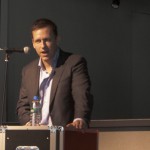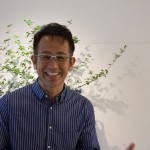As a part of its international expansion, online storage giant Dropbox recently announced a partnership with Softbank, a Japanese telecommunications conglomerate. In conjunction with his trip to Tokyo, its founder Mr. Drew Houston took the opportunity to speak at the Globis Business School with its founder-president, Mr. Yoshito Hori.
Mr. Hori: Tonight, I’d like to talk about your upbringing, your life at MIT, and your founding of Dropbox. Let’s start by asking where you were born.
Drew: Sure. First, thank you for having me. And thanks to all of you for coming. I was born in New England, Massachusetts and I grew up in a town a half hour outside of Boston. When I was a kid, running around our living room, my dad bought a PC which was an affirmative event in my life.
Mr. Hori: Oh that’s nice! How was it for you?
Drew: I was probably too afraid. This thing had a lot of buttons. Today, we just get a screen. Anyway, I started out by gaming and then I wanted to change the game. So that’s when I started to learn. My dad saw that I was very interested.
Mr. Hori: How old were you then?
Drew: I was five, but my dad never thought I’d be writing my first line of code. I would write programs that asked me “How old are you?” or “What is your favorite color?” so that’s where I got my first start and I got stuck with it. After my first job babysitting, I eventually got a job in programming. When I was in junior high school, I signed up as a tester for this online game. But I got kind of bored because they were not developing the game fast enough. I started looking at how the game worked because I was curious. And then I emailed them “Hey guys, there’s some things that you should do with this in a different way.” They liked my ideas and offered me a job. They were in Colorado, which was too far for me to move. So I started working for them over the Internet.
Mr. Hori: How old were you when you started this?
Drew: I was 14. My dad had to sign all the paper work, since I was still underage.
I had my first experience with stock options in startups. Most of the time, they aren’t worth anything.
Mr. Hori: Soon you moved to MIT.
Drew: I was interested in studying computer science. I was excited by MIT’s reputation for computer science as well as for some other connections. My dad is an electrical engineer. My grandfather – on my dad’s side – also studied at MIT.
During the summer I was still working at the same company from the time I was in high school. It’s actually easy for one to take a year off at MIT. I was either going to spend a year and then go study abroad in France, or I was going to take a leave of absence and work for a startup. I ended up starting my own company. My first company specialized in SAT preparations. I’m sure by now that all of you in this room have had the joy of studying for various standardized tests. At the time, I hated the fact that there was an 800-page book, in which you had to fill out the tests and grade yourself. And my parents also made me go to these classes: show up at 8AM on a Saturday morning and learn from someone who was reading out of another 800 page book. It felt stupid. This should all be online, and I used some tricks. Instead of using flash cards for all the vocabulary, I made software to do that. So to make a long story short, I started an online SAT prep company with my former teacher from high school. He already had his own SAT prep company running from his living room. That was my first experience as a founder when I took a year off.
Mr. Hori: How did it go?
Drew: I didn’t worry too much about how things were going then, but when I look back I view things completely differently. There were parts that were great, others that were stupid. It forced me to learn about business. My first company was called Accolade. We didn’t raise any money. It was called bootstrapping. We could only spend what we had from our cash flow. We weren’t making any money so we didn’t want to hire a lot of people.
So I’d be in my room writing math questions. At some point, I realized that I could only tolerate writing so many questions about parallel lines, the train leaving one town and meeting another at the other town. So if any of you got questions about SAT, I can tell you all about it.
Mr. Hori: What happened after that?
Drew: I was finishing my degree. So I had to work at night and on weekends at the company. But eventually I got restless because the business was seasonal. People don’t take SATs all year round and if you study, you’d hope to take it just once. We continued to develop the site, but slowly. We didn’t make any money so we didn’t hire any people. We weren’t efficient. If we wanted to do our taxes, most of the time you’d hire an accountant. But we didn’t have the money to do that. So my cofounder and I would flip a coin, and one of us would read the tax codes at a public library. We had to file the forms ourselves. With things like that, we learned the hard way.
Mr. Hori: You went back and finished your degree. Did you graduate?
Drew: Yes, I graduated.
Mr. Hori: What happened after graduation?
Drew: When I graduated, there were lots of things happening. I was still working on my company, but also got involved with a security company in Boston. I was getting burned out.
So I started finding distractions. One of them was online poker. They would use all these security measures, but it’s not impossible to create a poker bot for it. So I started making one and got obsessed with the problem. That summer, my parents wanted me to reunite with my family. They would rather I got away from the technology. But I still pulled up all my cards, my computers and my monitors to set them up in my dining room. My mom thought I was going to jail. But this was a really interesting problem, and it suddenly revitalized me. Of course, this wasn’t going to make me a lot of money either. What happens is, instead of you playing poker and losing all your money, you watch your poker bot with the bugs lose all your money for you. So it was only about break even. And then poker became more illegal in the US.

Mr. Hori tried to learn the secret to Drew’s success
Mr. Hori: Then you founded the business of online storage.
Drew: Right around then. All of the files regarding my SAT prep company storage were kept on this little thumb drive, because I needed to work across my computers. There was supposed to be an idea of online storage; it’s not a new idea. I tried but it drove me crazy that nothing really worked. I had all these problems because my cofounder and I would be emailing each other Word documents and keep screwing it up. You’d work on something and then realize a new version is in another email. And then I had to go to a store and buy a bigger hard drive.
So we had all these frustrations that we had to correct. And eventually when I got on the bus, I realized I forgot my thumb drive. This was in the days before the iPhone. If you didn’t have anything to do, you really didn’t have anything to do. I didn’t want to spend next 4 hours sulking, so I opened up my editor and started coding. I had had this problem so many times that someone had to fix this.
Mr. Hori: How was this different from your previous startup?
Drew: I think there are things in your control and things outside your control. We were fortunate that this was not a common problem. Most people had one computer. As soon as smartphones came around, everybody has two computers. Now, everybody has a problem. The market got bigger, but nobody had solved this problem in a good way.
At the same time, one of my best friends from MIT had started a company. This was roughly in 2006, one year before Dropbox started. After getting invested by Y Combinator, a prestigious startup accelerator, all these angel investors became interested. He moved to California and left me behind. Suddenly a few months later, he’s like “Hey Drew, I have some news. Vinod Khosla” – he founded Sun Microsystems – “he is giving me $5 million.”
Whatever lane of traffic he was in, I was stuck somewhere else. He was learning much faster. He made a lot more progress in 3 months than I had in 2 years. In the back of my mind, I was looking for something really exciting.
Mr. Hori: Soon you got into Y Combinator yourself.
Drew: A couple of months later, my friend Adam from California and I were tackling this problem with the thumb drive by making a prototype, doing a lot of coding. I was applying to Y Combinator, but they were complaining that I didn’t have a cofounder. They were not interested in funding single founder companies because they believed, through their experience, that the companies that were doing the best worked in teams. This was a problem for me because the application deadline was just a couple of weeks away. It’s like saying, “you need to get married in the next two weeks.” I spent some time visiting Adam and meeting other Y Combinator founders. I was complaining to anyone who would listen; I have a lot of smart friends from MIT who weren’t willing to quit their job or had something else going on. A different friend from MIT ended up introducing me to someone who is now my cofounder, Arash. At that time, I posted a video of my prototype online, just to give some early peek as a side project. It turned out that Arash had already seen the video, and got excited. We got introduced and hung out in the café in MIT for a couple of hours. When we decided to do this, I told him he hadn’t graduated yet, and he replied, “That’s okay, I’ll just drop out.” It’s like getting married on the first date. He is an amazing person, and I was very lucky.
Mr. Hori: Then you got funded by Y Combinator.
Drew: We got $15,000, which was 6 percent of capital at that time. When you come up with an idea it’s not really worth anything. With the investment, we got excited. We went through Y Combinator’s program for 3 months and finished it with a Demo Day, where we got to pitch the project to investors.
Later we needed to raise more money, so we met this Iranian angel investor who happened to own a drug store. He also made money by leasing some space to PayPal. You know things like this can only happen in San Francisco. Anyways, he began speaking Farsi with my cofounder, and soon introduced us to Sequoia Capital, one of the best venture capitalists in the world. It was quite intimidating. We just explained to them in pretty plain language. Their website had instructions on pitching: tell them about the 10 things you care about. We told them, “Hey, this is 2007 and it is crazy.” We had fast Internet connections with great computers, but we still couldn’t get the basics right on keeping my files safe or sharing them with other people. After all, in Mission Impossible, Tom Cruise doesn’t open up his files from his Gmail, or go “Damn it, I forgot my thumb drive!” To our shock, they invested $40 million for roughly 30 percent of our shares.
Mr. Hori: What were the biggest challenges you faced?
Drew: Recruiting. It was hard then, it’s hard now. There’s a war for talent. Great people always have different opportunities.
Mr. Hori: How do your view your competitors?
Drew: We’ve always liked competition. Back when we started, there were hundreds of services provided by startups. Now, we have Google, Apple, Microsoft, Tencent, and every big company. Even if competition is important, we can’t get too obsessed about it. People have copied what we’ve done, but there are always things that are broken that nobody has solved.
Mr. Hori: What did you do right and what did you do wrong?
Drew: We had a good early team. We hired our smartest friends from MIT. I ask my investors for advice, who remark “That’s funny, I ask my investors for the same advice.” When I took out my note and pen to write down the top 10 things to do, one of them told me “Hire the best people, hire the best people…”
What company would hire mediocre people? It’s not only about raising the talent bar. One of our investors started a company that was acquired by Microsoft for $300 million. He told me it was the worst day of his life. While things started falling apart, he walked into his office one day and thought, “I don’t like these people and I can’t fix it.”
Mr. Hori: What could you have done better?
Drew: Most of the things could have moved faster, but that’s only because of perfect hindsight. Everybody starts as a first time founder, so you can’t expect to make all the right decisions. Trying to build on your judgment is really important, especially when it comes to people. As a company grows and leaders change, someone who killed themselves for years building the company may not be the right person for the next stage. They start drowning, so you have fire them. That’s very easy to say and hard to do.
Mr. Hori: Is there anyone who you admire?
Drew: When I was little, the first entrepreneur I learned about was Bill Gates. He built an amazing company that changed so much about how we live. But I also try to find inspiration from those outside of tech. Like Bill Walsh, the coach of the 49ers, who thought carefully about the ‘culture’.
Mr. Hori: Do you have a personal motto you live by?
Drew: We have a label maker in the office, and we printed one that says, “Just effing do it.”
Mr. Hori: I’m sorry, what?
Drew: I’m not going to explain, but it’s kind of a Nike plus one.
Mr. Hori: You’re 32. What do you want to achieve in your lifetime? What is your vision, your dream?
Drew: In the beginning, I didn’t think my company would be worth this much. Here was an interesting problem, and in the worst case, at least I wouldn’t have to carry a thumb drive. You need to have two things in your mind: not to stress yourself and thinking like a businessperson.
I never get tired of seeing people using Dropbox. We started with one particular problem, but as we have bigger engineering and product development teams we can do more things. As much as we don’t have to email ourselves files anymore, the way we work is still screwed up. We don’t notice how annoying that is. Nobody’s really designed a different working experience. My dream is to continue finding problems to keep working on.
Drew Houston
Born in Massachusetts in 1983, Drew Houston graduated from the Massachusetts Institute of Technology. After participating in and founding startups, Drew founded Dropbox in 2007 and serves as its CEO.
Yoshito Hori
Born in Ibaraki prefecture in 1962, Yoshito Hori graduated from Kyoto University. Following his career in trading, Mr. Hori founded Globis in 1992. He is currently its Headmaster, Chairman, and CEO.
More interviews...
Richard Rowland
Latest posts by Richard Rowland (see all)
- Python Conference Chairman: Building a Programming Community, One Coder at a Time - March 5, 2023
- Searching for Kurosawa – Why I took 38 Years to Release His Footage - February 6, 2023
- Internet Pioneers Place Next Bet on Blockchain - August 13, 2016




